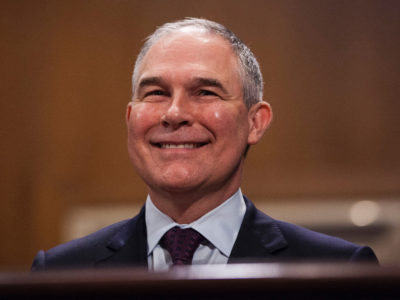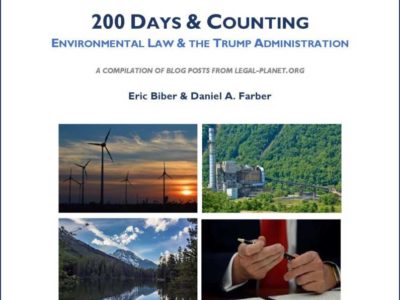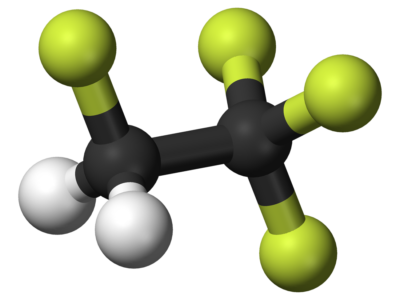EPA
The importance of intra-executive branch checks and balances
We are used to thinking of the different branches of government checking each other. Scott Pruitt’s behavior illustrates the need for stronger checks and balances within the executive branch
As Dan recently pointed out, Scott Pruitt has a lot of explaining to do these days, about his housing situation last year, about his travel as EPA Administrator, about how two of his close aides ended up with hefty pay raises, and more. Even Fox News is asking questions. I want to make a different …
Continue reading “The importance of intra-executive branch checks and balances”
CONTINUE READINGScott Pruitt: “What, me worry?”
The right question about greenhouse gas emissions is not whether there is an “ideal” global temperature regime, but what problems rapid regime shifts produce
(Readers of a certain age will understand the reference, and see the resemblance. If that’s not you, never mind. But read on for a little less snark and a little more analysis.) According to the Washington Post, EPA Administrator Scott Pruitt wondered in a television interview Tuesday whether global warming “necessarily is a bad thing,” …
Continue reading “Scott Pruitt: “What, me worry?””
CONTINUE READINGState of Play: Trump v. the Environment
Here’s a roadmap to what he’s done — and how things will probably unfold.
How has Trump impacted environmental law? What’s going to happen next? CLEE has issued a new report assessing the state of play in environmental law seven months of the Trump presidency. The report, 200 Days & Counting, reviews the Administration’s environmental proposals and offers a glimpse into what may be coming down the pike. The report focuses …
Continue reading “State of Play: Trump v. the Environment”
CONTINUE READINGSetback for EPA in Regulating Gases with High Global Warming Potential
DC Circuit vacates 2015 rule on HFCs
Today, the D.C. Circuit Court of Appeals vacated a 2015 EPA rule targeting the use of hydrofluorocarbons (HFCs), a class of potent greenhouse gases that are used as refrigerants and propellants for a variety of purposes as a substitute for ozone-depleting chlorofluorocarbons (CFCs) and hydrochlorofluorocarbons (HCFCs). The court’s decision is a setback for President Obama’s …
Continue reading “Setback for EPA in Regulating Gases with High Global Warming Potential”
CONTINUE READINGGuest Blogger Gregory Dotson: Is Scott Pruitt Calling for an Amendment to the Clean Air Act?
EPA Administrator Resorts to Misleading Rhetoric in Possible Prelude to Revisiting Massachusetts v. EPA
Since he was confirmed to lead the U.S. Environmental Protection Agency six months ago, Administrator Scott Pruitt has relied on three points when discussing the issue of climate change. He has cast doubt on the science by claiming it’s difficult to know the human role “with precision.” He has questioned the ability of the agency …
CONTINUE READINGWhither WOTUS?
Trump ordered agencies to reconsider Clean Water Act jurisdiction. Easier said than done.
President Trump ordered EPA and the Army Corps to review the Obama Administration’s WOTUS rule, which sets expansive bounds on federal jurisdiction over water bodies and wetlands. The agencies have sent the White House a proposal to rescind the WOTUS rule and revert to earlier rules until they can come up with a replacement. In my …
Continue reading “Whither WOTUS?”
CONTINUE READINGEnvironmental Budget Update
Trump’s brutal attack on environmental spending seems mired in Congress.
It was clear early on that the stop-gap funding measure rejected Trump’s budget priorities. Emerging details about the bill demonstrate how starkly Trump lost. Environmental and energy programs survived with very little damage. Let’s begin with the EPA budget. Trump sought an immediate cut, followed by a 33% cut in the next budget. Instead, EPA …
Continue reading “Environmental Budget Update”
CONTINUE READINGWhen EPA Pays Lip Service to Public Comment, the Environmental Community Steps Up
Environment and public health advocates voice their concerns about EPA’s regulatory reform efforts under EO 13777
The public health and environmental communities took a small victory on an EPA conference call yesterday. In a three-hour public comment call that could have been dominated by industry seeking regulatory rollbacks, about half of the speakers supported strengthening environmental and public health protections. And many of them took EPA to task for such a …
Continue reading “When EPA Pays Lip Service to Public Comment, the Environmental Community Steps Up”
CONTINUE READINGGuest Blogger Ben Levitan: The Tenth Anniversary of Massachusetts v. EPA
The opinion stands for EPA’s responsibility to address climate change based on law and science, and to safeguard public health and the environment under adverse political conditions
If it feels like we’re being inundated with bad news about federal climate policy, here’s a cause for hope: this month marks the tenth anniversary of the Supreme Court’s decision in Massachusetts v. EPA, one of the most important environmental cases in our nation’s history. The Supreme Court’s landmark decision in Massachusetts came when the …
Continue reading “Guest Blogger Ben Levitan: The Tenth Anniversary of Massachusetts v. EPA”
CONTINUE READINGA Motley Crew
Trump has placed about a dozen people in EPA. They’re already causing problems.
ProPublica has a list of Trump appointees to agencies. They can be aptly described as a motley crew. The most significant is probably Senior White House Advisor Donald Benton, a former Washington State senator and Trump’s regional campaign manager. Once ran a county environmental office. According to the Seattle Times, “he has an almost perfect …
Continue reading “A Motley Crew”
CONTINUE READING










